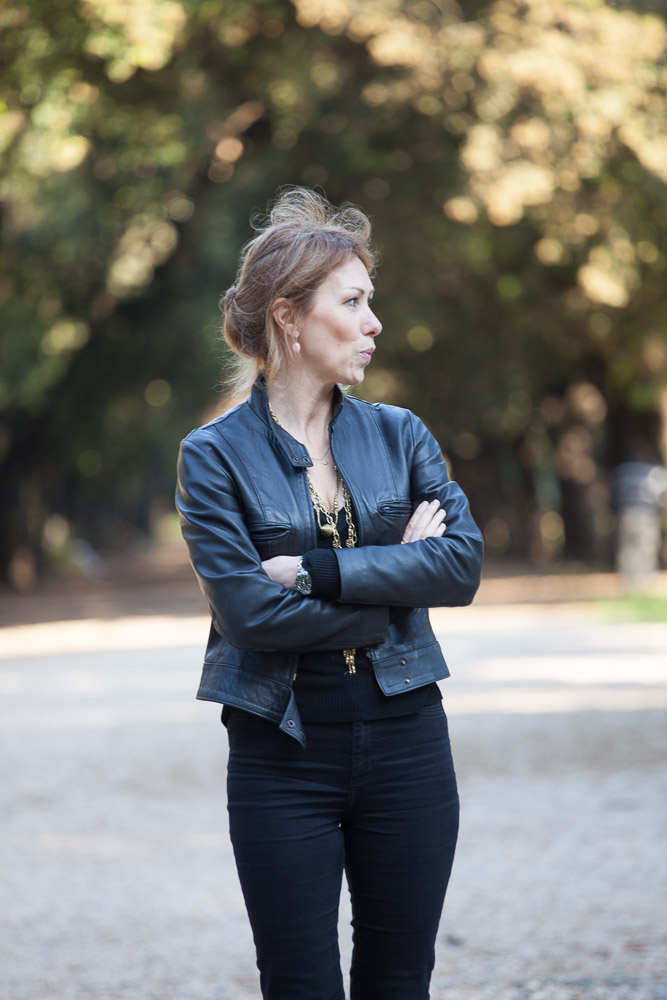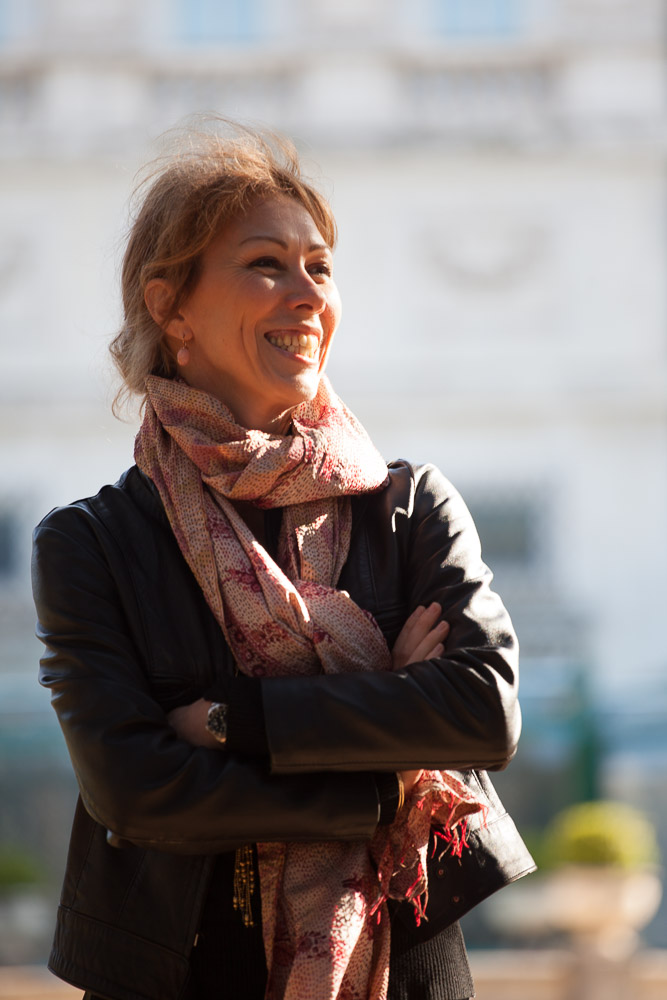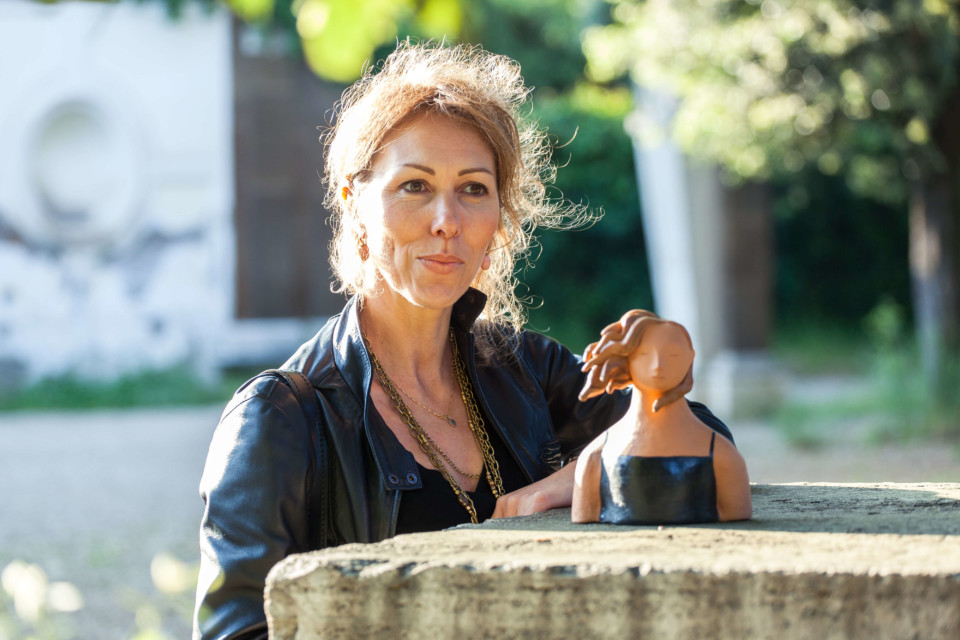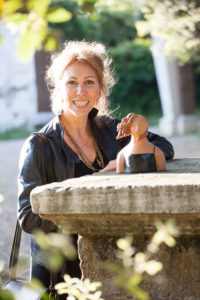P A O L A
Rome | 2019
P A O L A
Age — 48
Love life — Single
Profession — Sculptor
Years in Rome — All her life, studied art in Zurich for some years
Location — Villa Borghese
T H E R O M E S T O R I E S
‘SISTERHOOD
IS IMPORTANT,
WOMEN NEED TO
CLAIM MORE
SPACE’

- What does Rome mean to you? “I was born here, but my roots aren’t pure Roman. My parents were living in Milan, but my mother wanted me to be born in Rome. Just in time she kind of fled from cold Milan to warm and sunny Rome, haha. There’s a big difference between Milan – where people are quite rigid – and Rome, where the people are easygoing and warm. In some authentic parts of Rome, this feeling of humanity and community is rooted very deeply. The women there are characteristic Roman women—they’re strong, brave, practical and very direct and rough in their speech. Rome is fascinating, it’s so beautiful and so ugly at the same time. It has this authentic beauty, but some places are abandoned and dirty—I really like those contrasts. There are many things I still have to discover in Rome. You can fill your mind and eyes constantly with stunning churches, paintings, streets and people – you never feel alone here. When I lived in Zurich to study art, I felt the opposite. Every day I was going to the same bakery and our whole conversation consisted of ‘good morning’. When I came back to Rome and wanted to order a coffee in a café, I had to wait because the lady was chatting with another customer. Then she spoke to me in a warm Roman dialect and said, ‘A Ninì che voi?’ (‘What would you like, dear?’) I melted and felt it was time to come back. Compared to other European cities, Rome hasn’t changed a lot over the years, the shops and streets have largely remained the same. It’s comfortable, but it also feels like the city is a bit stuck. Daily life in Rome is hard, everything is still so difficult and chaotic. If you’re trying to pay a bill, you can easily spend two hours at the post office.”
- What is your best personality trait? “Mama mia… Maybe that even when I’m under pressure, I stay calm and in control. I used to be a filmmaker, I made travel documentaries about places like Peru, Bolivia, Ghana, Uganda, Guinea Bissau and Eritrea. I had to stay sharp to be able to deal with strange situations and people who were very different from me. For example, we were shooting some footage in Africa and all of a sudden the military showed up and the atmosphere got a bit tense. Men tend to lose their temper faster than women, so the men got into a fight and I had to step in the middle to calm everybody down. That was quite funny, actually. Women don’t need any affirmation that they’re stronger than the other person, so I was able to talk with the sergeant in the way he wanted to be addressed. He wanted to be seen as a powerful man and I knew exactly how to do it—men are so easy to neutralize, haha.”
- When do you feel different than other women? “If I compare myself to other women my age, I’m certainly different because I don’t have a family. I didn’t have the opportunity or I didn’t want it. Those things are connected: if you really want something, you make it happen. I’m totally OK with it, but in this time and culture it’s still not so easy to understand for some people. Especially men get confused that they can’t put you in a box. They don’t understand why you took a different path and wonder what’s wrong with you. Or they think you like to be free and want to be with a lot of different men, but that’s not the case. I just didn’t feel the urge to have children, I chose different things in life, so it wasn’t my priority. But I just go my way, I am what I am and I can’t be concerned with what other people think of me. I’m unambiguously single—at least for the moment, haha.”

- What is the best advice anyone ever gave you? “My father gave me a piece of advice from Shakespeare, ‘There is nothing either good or bad but thinking makes it so.’ It’s true. You can even look at sad and hopeless situations in a positive way. Keeping a positive mindset helps you in your daily life and during the most difficult times. For example, my father getting sick was bad, but also beautiful, because we became close and developed a relationship with each other that we never had before.”
- What is your biggest struggle? “Being an illustrator and filmmaker was very interesting and gave me a lot, but after a while I got a bit bored. So now it’s time for another passion, sculpting. It was not easy to change jobs, so I was a bit concerned. In the beginning I had very weird dreams about it. I know that this new job will only work for me if I become very, very active in promoting myself, but I’m not always in the mood. It’s so much easier to just focus on the creative part of sculpting.”
- What is your biggest disappointment? “I really like the idea of living on an island for six months or a year, but I never had the courage to do it. I’m slightly disappointed with myself that I haven’t been brave and determined enough to do it, because I believe you can do anything. Maybe the right moment still has to come.”
- What is the best thing that ever happened to you? “I’ve been very fortunate because I’ve had the opportunity to travel. I met a lot of people and had so many interesting experiences. Travelling is something that opens your mind and sparks your curiosity. I like to study the place I visit in advance. My curiosity makes me want to dive deeper into the culture and the history of a country. I always discover interesting things. At the moment I’m passionate about how spices were traded all over the world in the past. It’s fascinating.”
- What advice would you give other women in Europe? “It would be beautiful if we could all be connected in some way. I think sisterhood is important, because the world is still too much male-oriented and we need strong relations with each other to claim more space in this world. We’re in a strange place at the moment, we haven’t yet found the right way to be a woman in this society. I think all women should at least know how to have a good relationship with themselves, their bodies and other women. But we’re still struggling with male power. There’s a lot of work to do, men need to be educated, some of them still think that if you’re dressed in a certain way, it means something. This is absolutely horrible. But women need to change their mindset as well. They often take on the male mentality to get somewhere and achieve things. Moreover, I think women have to learn how to be really independent. A lot of my female friends have powerful jobs, but in the end they’re still somewhat dependent of the judgment of men—there’s this need to be accepted by them. But Italy isn’t a completely masculine society. There is no strong macho culture in Italy, it’s just a façade, it’s not how things really are. I think men are much weaker than how we perceive them. Italian men aren’t so bad, they are empathic and they have respect for women in some way, because they’re so tight with their mothers. But it can easily get worse when we have a right-wing government again which promotes a macho culture.”
- What is your biggest sadness? “The passing of time might be the saddest thing in life. It’s not really a sorrow, but it’s a fact, life is short. Especially when you start to get older, it feels that time is running faster. That’s also why I started to make sculptures. I don’t know how many years I have left, so I have to do it now. Nothing lasts forever, not a job, not relationships, nothing—so you have to catch the moment.”
- What can really hurt you? “When people are too focused on themselves. It often happens that people only talk about their own problems and don’t ask me how I’m doing. I accept people for who they are, so then I make a decision about the kind of relationship I want to have with them. With some friends I just have a glass of wine, while with others I go deeper and have a stronger relationship.”
- What makes you happy “Salty water. I love the sea. I love being on the water and seeing the coast, and I love to be under water watching the fish. I do free diving and it gives me such a mental training. You feel so different under water, when you’re alone by yourself and you’re becoming one with the water. You really melt into it. It’s a beautiful sensation. Seeing the white rays of light going through the water and disappearing in this beautiful shade of blue, is one of the best experiences in the world.”
Photos by Piero Cremonese


